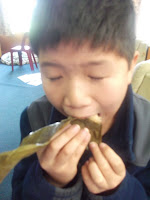Goodness me, we have been busy!! I guess as the old saying goes....time flys when you're having fun.At The ODC we are always busy, and we always seem to run out of time in the day. The last few weeks have been no acception. We celebrated Bring - a - Buddy Day in Week 4. We have in the past celebrated this time during Term 4, but I believe it is much more beneficial having it earlier. Makes sense really; I'm not sure why we haven't done it earlier before? Unfortunately there are no pictures to share of our Bring - a - Buddy Day, as I don't have permission from our visitor's parents! Will add this to the permission slip for next year.

Yeah!! We finally got our brain models completed!! We had to use plastercine and reference books to identify the different areas of the brain. We the
n needed to explain the different functions. We used 'language of the Discipline'( Depth and Complexity Icon) to complete this activity.In Week 5, we moved away from the anatomy of the brain and investigated how our brains actually work. Did you know the human brain has 10 billion neurons (this many: 10,000,000,000)Each of these neurons has between 1,000 and 10,000 connections with other neurons, making up to 10 trillion neuron connections possible (this many: 10,000,000,000,000) .
Our first task was to sketch a neuron and label its parts using these words; dendrite, axon, soma and nucleus. We then had to investigate the 4 different types of neurons
; Sensory Neurons, Interneurons, Motoneurons and Pyrimidal Cells (receptors) and find out their functions.


Investigating neurons.......
Our final task was to investigate brain waves.....alpha, beta, theta and delta.

This term, as part of our Affective Curriculum, we are talking about what it means to be gifted. We have talked about the fact that there is no one definition on what it means to be gifted, but there are many academics out there who spend their lives studying, researching and then teaching others about it. Over the last few weeks we have been unpacking Joesph Renzulli's 3 Ringed Model.....see above. Renzulli considers three factors important for the development of gifted behaviour: Above average ability, creativity, and task commitment.
Within the above average abilities Renzulli makes a difference between general abilities (like processing information, integrating experiences, and abstract thinking) and specific abilities (like the capacity to acquire knowledge, perform in an activity).
By creativity Renzulli understands the fluency, flexibility, and originality of thought, an openness to experience, sensitivity to stimulations, and a willingness to take risks.
Under task commitment he understands motivation turned into action (like perseverance, endurance, hard work, but also self-confidence, perceptiveness and a special fascination with a special subject). Renzulli argues that without task commitment high achievement is simply not possible.
Only if characteristics from all three rings work together can high achievement or gifted behaviour be witnessed.
Taken from: http://www.gigers.com/matthias/gifted/three_rings.html


Unpacking Renzulli's 3-Ringed Model.
After unpacking Renzulli, we had to identify what fell in the center of the rings and how we showed it.























